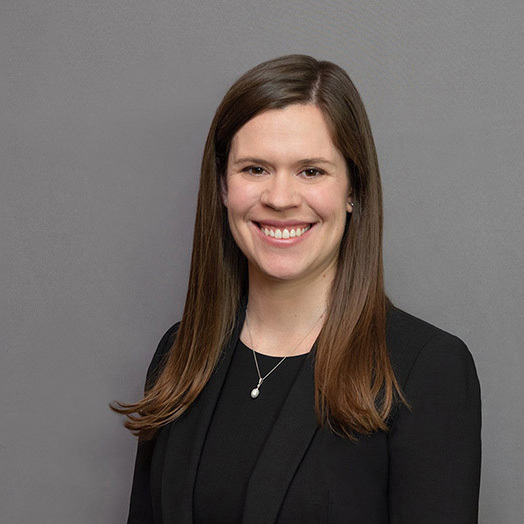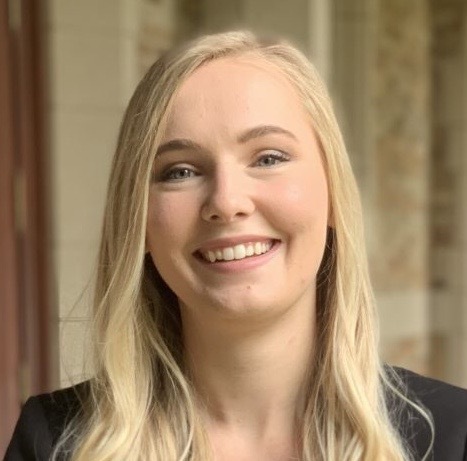Law School alumnae to clerk for US Supreme Court Justice Amy Coney Barrett
Two Notre Dame Law School graduates, Kari Lorentson and Elizabeth Totzke, will clerk for U.S. Supreme Court Justice Amy Coney Barrett during the 2024-25 term.
Barrett graduated from Notre Dame Law School in 1997. She joined the faculty in 2002 and remained a faculty member until her confirmation to the Supreme Court in 2020.

Kari Lorentson
Lorentson is a 2019 graduate of Notre Dame Law School.
“Clerking for Justice Barrett is a dream come true,” Lorentson said. “My very first class at Notre Dame Law School was civil procedure on a Monday morning — taught by then-Professor Barrett. I ended up taking several of her classes during law school and served as her research assistant.”
This is Lorentson’s second clerkship with Barrett. She clerked for then-Judge Barrett on the U.S. Court of Appeals for the Seventh Circuit in 2020. However, her clerkship was cut short when Barrett was confirmed to the Supreme Court.
“I am thrilled to spend an entire year learning from Justice Barrett at the Supreme Court,” Lorentson said.
Lorentson completed her clerkship at the Seventh Circuit with Judge Michael Y. Scudder Jr. She also clerked for Judge Gerald J. Pappert, a 1988 Notre Dame Law School graduate, of the U.S. District Court for the Eastern District of Pennsylvania immediately after she graduated.
“I’m grateful to have clerked for all three judges. They are sharp thinkers, generous mentors and models of integrity,” Lorentson said. “My experiences clerking at both district and appellate courts allowed for a front-row seat in witnessing the litigation process play out from start to finish. I’m excited to spend another year absorbing as much as possible from our nation’s top legal minds.”
As a law student, Lorentson served as executive editor of the Notre Dame Law Review and was a member of the Moot Court Board. She received the Col. William J. Hoynes Award, which is presented to one member of each graduating class and is Notre Dame Law School’s highest academic honor.
Lorentson said that several professors, along with her classmates, were especially supportive in preparing her to clerk during law school.
“The professors at the Law School are not only talented in their teaching and scholarship, but they are also deeply devoted to developing the next generation of lawyers. I’m also grateful for my classmates and for the collegial and supportive environment that the Law School fosters,” Lorentson said. “My professors at Notre Dame and the judges for whom I clerked instilled in me the importance of using my education to serve the public, and it is a privilege and honor to be able to do so at the Supreme Court.”
Anthony J. Bellia, the O’Toole Professor of Constitutional Law, said, “Kari Lorentson is a superb lawyer and a person of exceptional judgment. From her early days as a law student, she had an extraordinary ability to identify the core issues in complex legal problems, and to appreciate the broader significance of those issues for the legal system as a whole. She will serve Justice Barrett and the Supreme Court very well.”
Lorentson is currently an associate at Williams & Connolly LLP in Washington, D.C. She earned her bachelor’s degree from American University.
Lorentson’s time at Notre Dame made a lasting impact on her personal life as well. She met her husband, 2019 Law School graduate Matt Razzano, while in law school, and they have a young daughter, Charlotte.

Elizabeth Totzke
Totzke is a 2022 graduate of Notre Dame Law School. After graduating, she clerked for Chief Judge Diane Sykes of the U.S. Court of Appeals for the Seventh Circuit during the 2022-23 term. Totzke is completing her second clerkship with Judge David Stras of the U.S. Court of Appeals for Eighth Circuit.
“Clerking has been such an enriching, meaningful experience. It has exposed me to new areas of the law, helped me to grow as a legal thinker and writer, and introduced me to lifelong friends. I am so grateful to both Judge Sykes and Judge Stras for giving me these opportunities and for mentoring me along the way,” Totzke said.
Reflecting on her selection to clerk for Barrett, Totzke also expressed deep admiration for the justice.
“It is the honor of a lifetime to have been selected to clerk for Justice Barrett, whom I have admired since the start of my time at Notre Dame Law,” Totzke said. “She is a brilliant jurist, and perhaps even more importantly, she is an excellent role model with paramount integrity and a deep commitment to her faith and family. I am thrilled to have the chance to learn from her.”
Totzke sees her clerkship with Barrett as a significant opportunity for professional and personal growth.
“It is an immense privilege to have the opportunity to assist Justice Barrett as she and the rest of the court resolve the important cases of next term. I hope to serve well,” Totzke said. “I also am looking forward to learning from Justice Barrett, the other justices, my co-clerks and the country’s best advocates — both through observation and instruction. Whether it be at oral argument, in chambers, or otherwise, I have no doubt that next year will be filled with opportunities to hone my skills as a young lawyer.”
While at ND Law, Totzke served as the managing articles editor for the Notre Dame Law Review and as a student fellow in the Notre Dame Law School Religious Liberty Initiative.
Totzke received the Dean Joseph O’Meara Award, one of the three highest academic awards, presented annually to a member of the Law School graduating class for outstanding academic achievement.
“I feel so fortunate for my time at Notre Dame Law School. Not only did I receive a top-notch legal education, but I was also consistently reminded of the importance of leading a virtuous and meaningful life,” Totzke said. “My professors taught by example; they are as kind and generous as they are accomplished. I am so grateful for their mentorship and guidance.”
Nicole Stelle Garnett, associate dean for external engagement and the John P. Murphy Foundation Professor of Law, said, “Elizabeth was an exceptional student and a leader among her peers. I had the privilege of working with her on a Supreme Court amicus brief in an important religious liberty case, as well as co-authoring an op-ed with her about the case, and her contributions were outstanding. The opportunity to form young lawyers like Elizabeth, who will go on to do great things, is an immense privilege. I know that she’ll make Notre Dame proud.”
Totzke received her undergraduate degree from St. Norbert College. Her husband, Hunter Van Asten, is also a 2022 ND Law graduate.
Two members of Notre Dame Law School’s faculty will join Lorentson and Totzke as clerks for the October 2024 term.
Professor of Law Christian Burset will clerk for Justice Neil Gorsuch, and Associate Professor of Law Rev. Patrick Reidy, C.S.C., will clerk for Justice Brett Kavanaugh.
Lorentson and Totzke will be the fifth and sixth graduates of Notre Dame Law School to clerk at the Supreme Court since the 2019-20 term.
Notre Dame Law School has 14 former Supreme Court clerks on its faculty, which amounts to more than one-third of the Law School’s tenured and tenure-track faculty members.
In addition, the Law School is ranked No. 4 in the nation in placing graduates in federal clerkships, which are typically considered a stepping stone to clerking at the Supreme Court.
Originally published by at law.nd.edu on May 20.
Latest Colleges & Schools
- Prioritizing prenatal care may decrease low birth weight outcomes in The Gambia, Notre Dame research findsA new study co-authored by University of Notre Dame researchers highlights the importance of prenatal care for improving the health of mothers and newborns, providing evidence that can inform policy.
- Partial peace deals may facilitate comprehensive accords, offering roadmap for policymakers, practitionersPartial peace agreements — deals that address targeted issues on the way to larger comprehensive accords — could provide a blueprint for peacebuilding policymakers and practitioners, according to new University of Notre Dame research.
- Notre Dame Law School launches new Veterans Law ClinicNotre Dame Law School is launching a new Veterans Law Clinic, dedicated to providing free legal assistance to U.S. military veterans in matters such as disability claims and appeals.
- City of Gary and Notre Dame’s Housing and Community Regeneration Initiative announce vision and action plan for downtown GaryThe City of Gary and the University of Notre Dame School of Architecture’s Housing and Community Regeneration Initiative announced a “Vision and Action Plan” for downtown Gary during a news conference Tuesday (May 27). The final report serves as a roadmap for Gary’s leadership to follow to reestablish the city’s building culture.
- Notre Dame Executive MBA offers scholarships to area leadersMichiana Forty under 40 honorees can receive $30,000 toward tuition for the Notre Dame EMBA program.
- Kenneth Scheve appointed dean of the University of Notre Dame’s College of Arts and LettersKenneth Scheve, the Dean Acheson Professor of Political Science and Global Affairs and the dean of social science at Yale University, has been appointed the I.A. O’Shaughnessy Dean of the College of Arts and Letters by University of Notre Dame President Rev. Robert A. Dowd, C.S.C. Scheve, who will also hold a tenured faculty position in the Department of Political Science, begins a five-year term as dean on July 1.













